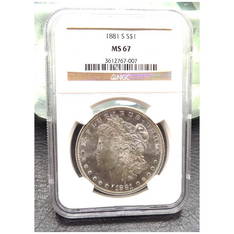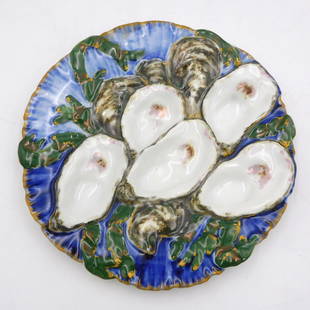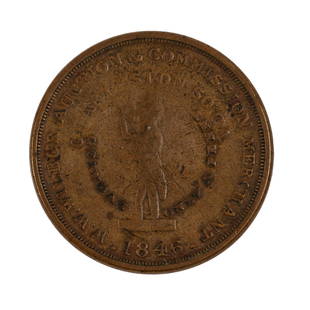
John Jay Re: $2.5 Million From the Treasury For Rev War Troops. Written as President of the
Similar Sale History
View More Items in Historical Memorabilia

Related Historical Memorabilia
More Items in Historical Memorabilia
View MoreRecommended Collectibles
View More


Item Details
Description
John Jay Re: $2.5 Million From the Treasury For Rev War Troops. Written as President of the Continental Congress 1779
In this letter to Commissary General Jeremiah Wadsworth, Continental Congress President John Jay acknowledges the receipt of a letter and enclosed papers, which he had referred to the Treasury. He promised to notify Wadsworth of any resolutions Congress passed on the subject.
[REVOLUTIONARY WAR.] JOHN JAY, Manuscript Letter Signed, to Jeremiah Wadsworth, August 11, 1779, Philadelphia, Pennsylvania. 1 p., 7.5" x 12.25". Docketed on verso; general toning.
Complete Transcript
Philadelphia 11th August 1779
Sir,
Your Favor of the 3rd Inst, with the Papers enclosed in it, have been received, & referred to the Treasury. Whatever Resolutions Congress may enter into on the Subject shall be communicated to you without delay.
I have the honor to be Sir,
With Sentiments of Esteem / and Regard
Your most Obedient / and Humble Servant,
John Jay / Presid
Jeremh Wadsworth Esqur
Historical Background
Jeremiah Wadsworth had been appointed Commissary General of Purchases in April 1778. By June 1779, he tendered his resignation, but Congress initially refused to accept it. In this letter, Congress President Jay informed Wadsworth that he had received his letter and enclosures and referred them to the Treasury.
On August 9, 1779, the Committee on the Treasury presented a report, and Congress ordered, among other things, "That a warrant issue on the treasurer, in favour of Colonel Jeremiah Wadsworth, commissary general of purchases, on the application of Chaloner and White, assistant purchasing commissaries, for two millions five hundred thousand dollars, for the use of his department; for which the said commissary general is to be accountable."
On September 1, 1779, the members of the Continental Congress passed a resolution "That the commissary general of purchases be directed to appoint a deputy, for the special purpose of providing for the troops of the convention of Saratoga and their guards during their stay in Virginia." The Congress also instructed Commissary General Wadsworth (1743-1804) to instruct the deputy to "confine his purchases, to places from whence supplies for the armies of these states cannot conveniently be drawn" and to keep the accounts of supplies for the convention troops separate from those purchased for troops of the United States. The Convention Army of Saratoga were the British, German, and Canadian troops captured by the Americans when British General John Burgoyne surrendered his command after the successful Battles of Saratoga. They were held near Charlottesville, Virginia, until 1780, when they were moved to Frederick, Maryland, for the remainder of the war.
Wadsworth continued to press Congress to appoint a successor, insisting that he would not serve beyond the end of 1778. Congress reluctantly accepted Wadsworth's resignation and appointed Ephraim Blaine (1741-1804) of Pennsylvania, Wadsworth's former deputy, as Commissary General of Purchases on December 2, 1779.
John Jay (1745-1829) was born in New York City into a prominent merchant family of Huguenot descent, and graduated from King's College (Columbia University) in 1764. After graduation, he became a law clerk for a prominent attorney. Admitted to the bar in 1768, Jay established a law practice in New York City. Initially cautious, Jay became a moderate and then ardent Patriot in the American Revolutionary struggle. He served in the First and Second Continental Congresses. He served in the New York Provincial Congress, where he drafted the 1777 Constitution of New York. His work in New York prevented him from voting on or signing the Declaration of Independence, though he supported it. From 1777 to 1779, he served as Chief Justice of the New York Supreme Court of Judicature. He also served as President of the Continental Congress from December 1778 to September 1779. After being appointed as minister to Spain but refused by the Spanish royal court, Jay helped negotiate the Treaty of Paris that ended the Revolutionary War. He served as Secretary of Foreign Affairs from 1784 to 1789 until Congress changed the name to the Department of State. In 1788, Jay joined Alexander Hamilton and James Madison in authoring the Federalist Papers. Jay's five articles largely dealt with foreign affairs. After declining George Washington's offer of the position of Secretary of State (continuing his earlier service), he accepted Washington's nomination to be the first Chief Justice of the United States, a position he held from 1789 to 1795. Jay was the Federalist candidate for governor of New York in 1792 and received more votes, but technicalities excluded the votes of three counties, giving Democratic-Republican George Clinton the governorship. President Washington sent Jay to England to resolve issues that threatened renewed war. In March 1795, when the Jay Treaty reached Philadelphia, Democratic-Republicans denounced it as a betrayal of American interests, but the Senate narrowly ratified it. While he was in Britain, voters elected Jay in May 1795 as governor of New York. He resigned from the Supreme Court and served as New York governor until 1801, when he refused both a re-nomination as governor and a re-nomination to the U.S. Supreme Court. He retired to a farm in Westchester County, New York.
Jeremiah Wadsworth (1743-1804) was born in Connecticut as a descendant of William Wadsworth, one of the founders of Hartford. Jeremiah Wadsworth went to sea at age 18 on one of his uncle's ships, became the first mate and then captain of his own vessel, and made a fortune in the West India trade. During the Revolutionary War, he served on committees to provide supplies for the Continental Army. From June to August 1777, Wadsworth served as Deputy Commissary General of Purchases. In a reorganization of the supply system, Congress appointed him Commissary General of Purchases in April 1778, and he held the position until he resigned in December 1779. He then served as the commissary for Comte de Rochambeau's army until the end of the war. He became close friends with Quartermaster General Nathanael Greene, with whom he formed some investment partnerships. After the war, he was a pioneer in banking, insurance, and cattle breeding. He served as a member of the Continental Congress in 1788 and a member of the Connecticut convention that ratified the U.S. Constitution that year. From 1789 to 1795, he represented Connecticut in the U.S. House of Representatives. He served in the Connecticut House of Representatives in 1795 and on the state's Executive Council from 1795 to 1801.
This item comes with a Certificate from John Reznikoff, a premier authenticator for both major 3rd party authentication services, PSA and JSA (James Spence Authentications), as well as numerous auction houses.
WE PROVIDE IN-HOUSE SHIPPING WORLDWIDE.
Buyer's Premium
- 25%
John Jay Re: $2.5 Million From the Treasury For Rev War Troops. Written as President of the
Shipping & Pickup Options
Item located in Wilton, CT, usPayment

Auction Curated By















































![John F. Kennedy White House used coffee table: [KENNEDY, JOHN F.] Coffee table used in Kennedy White House. A rectangular mahogany coffee table by Drexel (with their stencil markings), with a central drawer and fluted legs, about 59 inches (L) x 1](https://p1.liveauctioneers.com/292/326828/175963031_1_x.jpg?height=310&quality=70&version=1713473479)

























![George Washington Signed Discharge: Partly printed discharge document signed by George Washington, as Commander in Chief of the Armies of the United States. Newburgh, [New York], 4 January 1783. 1 page, ## x ## in. Undersigned by Washin](https://p1.liveauctioneers.com/7226/322253/173251475_1_x.jpg?height=310&quality=70&version=1710004847)
![[Ambrotype] Texas Confederate Soldier: Sixth plate ambrotype. Full leatherette case. Portrait of a possible Texas Confederate soldier. A silver star device was used to pin up the brim of his light-toned headgear, a look often seen in image](https://p1.liveauctioneers.com/7226/322253/173251509_1_x.jpg?height=310&quality=70&version=1710004847)





